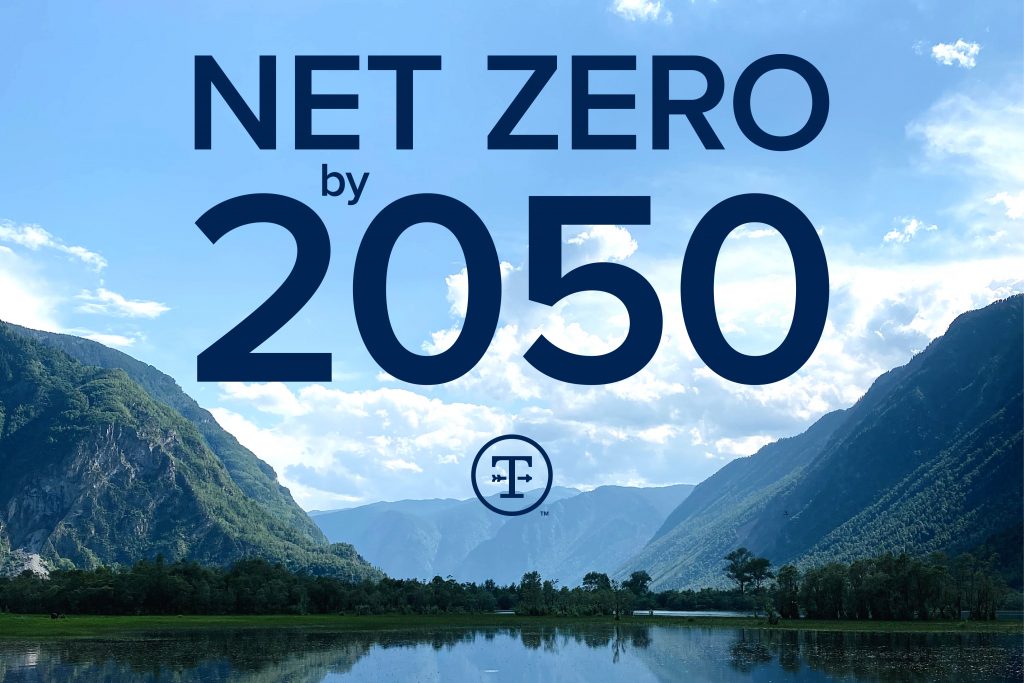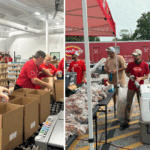At Tyson Foods, our ambition is to be the most sustainable and transparent food company in the world, and we’re proud of the work our team members do every day to make this ambition a reality. Today, we’re excited to share our 2020 Sustainability Progress Report outlining our key sustainability achievements from fiscal year 2020. The Progress Report is complemented by a new online Environmental, Social and Governance (ESG) Hub that provides resources on all of our sustainability initiatives, including background information on key topics, ESG-related policies and an ESG data center.
We are dedicated to delivering sustainable food at scale to feed our growing world. Fulfilling this mission requires looking to the future and we’re excited to announce our ambition to achieve net zero greenhouse gas (GHG) emissions across our global operations and supply chain by 2050, including scopes 1, 2 and 3.
As one of the largest food companies in the world, we know we have an incredible opportunity to create meaningful, scalable impact. Alongside announcing our ambition to achieve net zero emissions by 2050, we want to outline our pathway for this aspiration. A key step towards net zero is to update our baseline emissions by the end of calendar year 2023 to align with limiting global temperature rise to 1.5℃, consistent with the Paris Agreement. Our target to reduce greenhouse gas emissions 30% by 2030, was approved by the Science Based Target initiative in 2018 and is aligned with the original 2° C threshold. In tandem with updating our baseline, we have identified four focus areas to help us achieve this new target.
Our Pathway
Renewable Energy
Reducing emissions in our own operations is a focus area on our journey to net zero. From our plants and facilities to our world headquarters in Arkansas, we need to convert more of our energy supply to renewable sources. As part of today’s announcement, we desire to increase our use of renewable electricity to 50% by 2030 across our domestic operations. As we transition to renewable energy supplies domestically, we will be able to outline a path forward for global operations to follow suit.
Increasing our commitment to sustainable land stewardship
As one of the largest providers of protein in the world, our independent farmers and ranchers take care of and cultivate a lot of land, both to supply animal feed and to support the poultry and livestock we depend on. This is core to what we do and as such, we want to make sure we are prioritizing ways we can continue to practice good land stewardship. As part of our initial land stewardship goal announced in 2018, we aspired to support improved environmental land practices on 2-million-acres of row crop corn. This includes adopting practices that reduce fertilizer use and soil loss as well as the amount of water needed to cultivate crops. Challenges and interruptions related to the COVID-19 global pandemic hindered our ability to scale our land stewardship work in 2020. Given those setbacks, we are reassessing our options and developing a plan to fulfill our 2-million-acre target as well as expand the total acres by 2025, including a total target of 100% of feed purchased by 2030. Additionally, we will expand our current 5-million-acre grazing lands target for sustainable beef production practices by 2025.
Deforestation
Part of sustainably feeding the world is ensuring the commodities we source support responsible forest management. That’s why we’re on a journey to better understand and manage deforestation risk in our global supply chain and have a target to be deforestation-free by 2030. We initially assessed the risk of deforestation in our supply chain in 2017 and found no to low risk. Due to the international growth in our business, we partnered with PROFOREST in 2019 to re-assess our deforestation risk. The assessment found that nearly 94% of our company’s land footprint was at no to low risk of deforestation. To proactively address the remaining six percent, we developed a Forest Protection Standard. To support the Standard, commodity action plans are being developed to outline the work required in each commodity area to support deforestation free sourcing. More information on our Global Forest Protection Standard can be found here.
Climate Policy
As we look toward achieving our net zero ambition, we know climate policy can play a role in the support, development and advocacy that ensures goals can be met and ensuring farmers are incentivized to implement practices capable of reducing emissions and increasing soil sequestration of carbon. In support of net zero and climate neutral policies, we will continue to join alliances, such as the Net Zero Business Alliance, that encourage companies and policymakers to advocate for further action to support and incentivize climate commitments. We will continue to voice our support for legislation on the local, state and federal levels that champion climate policies and legislation.
Ultimately, we know we cannot do this work alone; nor do we have all the answers on our own. But we are committed to partnering and collaborating with our customers, NGOs, farmers and ranchers, supply chain partners and other stakeholders to make progress on the path towards net zero emissions. We know that with our talented team members, firm resolve from our executive leadership, and supply chain partners, we will work together to make this ambition a reality.





